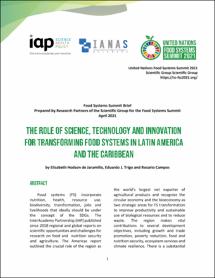Hodson de Jaramillo, Elizabeth; Trigo, Eduardo J.; Campos, Rosario: The Role of Science, Technology and Innovation for Transforming Food Systems in Latin America and the Caribbean : Food Systems Summit Brief Prepared by Research Partners of the Scientific Group for the Food Systems Summit April 2021.
Online-Ausgabe in bonndoc: https://doi.org/10.48565/scfss2021-6w45
Online-Ausgabe in bonndoc: https://doi.org/10.48565/scfss2021-6w45
@article{handle:20.500.11811/9151,
doi: https://doi.org/10.48565/scfss2021-6w45 ,
author = {{Elizabeth Hodson de Jaramillo} and {Eduardo J. Trigo} and {Rosario Campos}},
title = {The Role of Science, Technology and Innovation for Transforming Food Systems in Latin America and the Caribbean : Food Systems Summit Brief Prepared by Research Partners of the Scientific Group for the Food Systems Summit April 2021},
publisher = {Center for Development Research (ZEF) in cooperation with the Scientific Group for the UN Food System Summit 2021},
year = 2021,
month = apr,
note = {Food systems (FS) incorporate nutrition, health, resource use, biodiversity, transformation, jobs and livelihoods that ideally should be under the concept of the SDGs. The InterAcademy Partnership (IAP) published since 2018 regional and global reports on scientific opportunities and challenges for research on food and nutrition security and agriculture. The Americas report outlined the crucial role of the region as the world’s largest net exporter of agricultural products and recognize the circular economy and the bioeconomy as two strategic areas for FS transformation to improve productivity and sustainable use of biological resources and to reduce waste. The region makes vital contributions to several development objectives, including growth and trade promotion, poverty reduction, food and nutrition security, ecosystem services and climate resilience. There is a substantial diversity in STI capacities among the countries, with many having to confront significant restrictions, particularly with respect to financial and human resources. Nevertheless, significant developments have been made in some countries in biotechnology agricultural applications, conservation and regenerative agriculture and sustainable livestock production systems, as well as young entrepreneurships developing start-ups with impact in the regional bioeconomy. Considering this dichotomy should be an essential component of any strategy to confront the climate change crisis, and the aftermath of the COVID-19 pandemic, that are threatening food supply, nutrition, health and sustainability. The transformation of FS in Latin America and the Caribbean (LAC) with more precision and efficiency requires comprehensive, participatory and inclusive approaches that make full use of current and future scientific advances, including biotechnologies and digital technologies. Those advances are already transforming global agriculture where one is producing more with less, increasing efficiency, and reducing residues. Integration of STI developments and investment opportunities with national and regional policy making is essential, as well as communicating its potential to the public. Specific actions for LAC include: (a) use the great agrobiodiversity of LAC to diversify the FS, thereby increasing nutritional content and climate change resilience and new bioproducts; (b) enable and promote the use of digital technologies in the food value chain: and (c) use beneficial soil microorganisms and the microbiome for sustainable increases in productivity.},
url = {https://hdl.handle.net/20.500.11811/9151}
}
doi: https://doi.org/
author = {{Elizabeth Hodson de Jaramillo} and {Eduardo J. Trigo} and {Rosario Campos}},
title = {The Role of Science, Technology and Innovation for Transforming Food Systems in Latin America and the Caribbean : Food Systems Summit Brief Prepared by Research Partners of the Scientific Group for the Food Systems Summit April 2021},
publisher = {Center for Development Research (ZEF) in cooperation with the Scientific Group for the UN Food System Summit 2021},
year = 2021,
month = apr,
note = {Food systems (FS) incorporate nutrition, health, resource use, biodiversity, transformation, jobs and livelihoods that ideally should be under the concept of the SDGs. The InterAcademy Partnership (IAP) published since 2018 regional and global reports on scientific opportunities and challenges for research on food and nutrition security and agriculture. The Americas report outlined the crucial role of the region as the world’s largest net exporter of agricultural products and recognize the circular economy and the bioeconomy as two strategic areas for FS transformation to improve productivity and sustainable use of biological resources and to reduce waste. The region makes vital contributions to several development objectives, including growth and trade promotion, poverty reduction, food and nutrition security, ecosystem services and climate resilience. There is a substantial diversity in STI capacities among the countries, with many having to confront significant restrictions, particularly with respect to financial and human resources. Nevertheless, significant developments have been made in some countries in biotechnology agricultural applications, conservation and regenerative agriculture and sustainable livestock production systems, as well as young entrepreneurships developing start-ups with impact in the regional bioeconomy. Considering this dichotomy should be an essential component of any strategy to confront the climate change crisis, and the aftermath of the COVID-19 pandemic, that are threatening food supply, nutrition, health and sustainability. The transformation of FS in Latin America and the Caribbean (LAC) with more precision and efficiency requires comprehensive, participatory and inclusive approaches that make full use of current and future scientific advances, including biotechnologies and digital technologies. Those advances are already transforming global agriculture where one is producing more with less, increasing efficiency, and reducing residues. Integration of STI developments and investment opportunities with national and regional policy making is essential, as well as communicating its potential to the public. Specific actions for LAC include: (a) use the great agrobiodiversity of LAC to diversify the FS, thereby increasing nutritional content and climate change resilience and new bioproducts; (b) enable and promote the use of digital technologies in the food value chain: and (c) use beneficial soil microorganisms and the microbiome for sustainable increases in productivity.},
url = {https://hdl.handle.net/20.500.11811/9151}
}






